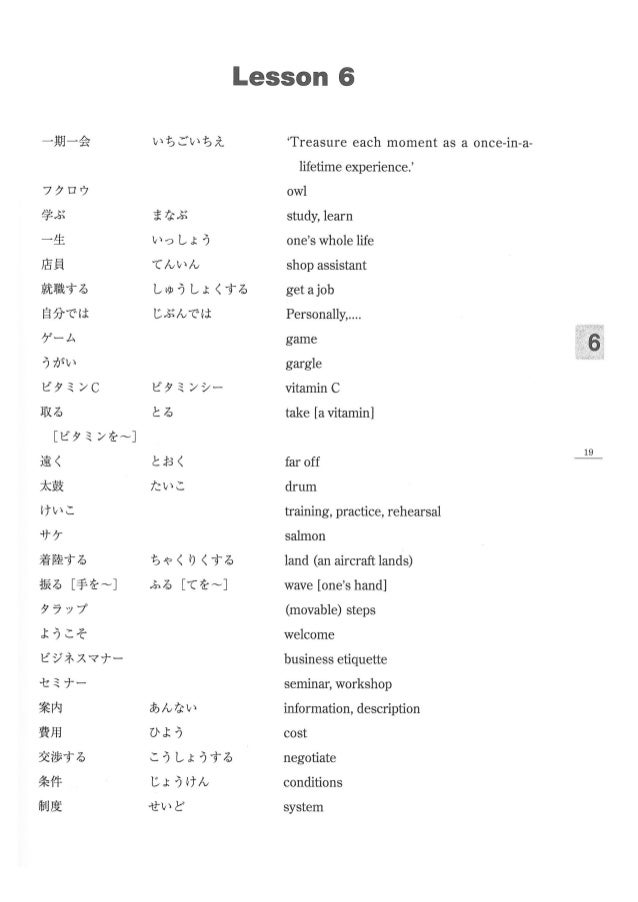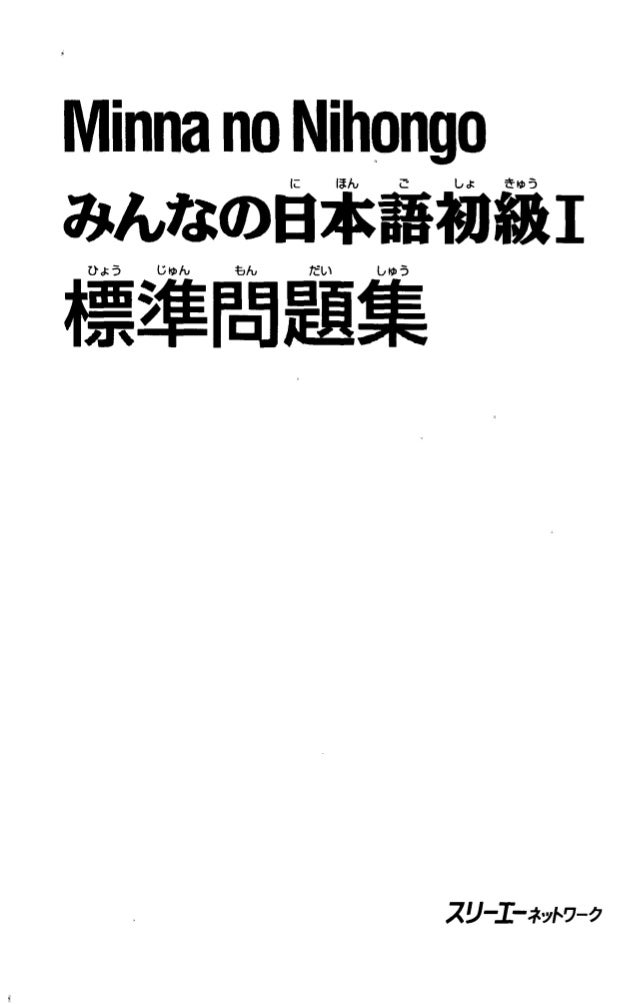Minna No Nihongo Chukyu Ebook Store
. Study goals These books will enable the general adult learner to make simple conversation or more advanced conversation in daily life situations. Through accumulated study, the learner will build up and develop his/her basic speaking ability.
Minna no Nihongo Shokyu I & II PDF eBook Audio MP3. 2019 4 Comments Edit. みんなの日本語初級 - Minna no Nihongo Shokyu is Japanese learning material textbook for beginners of for who new to Japanese. Advanced Android Anki Audio Audio Course Chukyu Communication Dictionary eBook Elementary EPWING Grammar Intermediate JLPT JLPT N1. Browse our editors' picks for the best books of the year in fiction, nonfiction, mysteries, children's books, and much more. The book 'Minna No Nihongo (Intermediate Bk I Chuukyuu, Book 1)' was ordered from Amazon and delivered fast and in good condition. It suits very well for.
With, the learner is taken to the next step - consolidating what he/she learnt in the Shokyu series and building on this to become a more fluent communicator at the lower intermediate level. Time Required Shokyu I: 100~150 hours Shokyu II: 100~150 hours Chukyu I: 100~150 hours Chukyu II: 150 hours Lessons Shokyu I: 25 Shokyu II: 25 Chukyu I: 12 Chukyu II: 12 Vocabulary Items Shokyu I: 1,060 Shokyu II: 900 Chukyu I: 1,000 Chukyu II: 2,430 Basic Sentence Patterns Shokyu I: 79 Shokyu II: 73 Chukyu I: 100 Chukyu II: 355.
New to Japanese? New to the sub? Welcome to, the hub on Reddit for learners of the Japanese Language.
If you are new to learning Japanese, read the. Check to see if your question has been addressed before posting by searching or reading the wiki. Not doing so falls under 'Low effort' (see rule 7).
State your question clearly in your post title 3. Consider the OP's skill level when answering a question 4. Do not guess or attempt to answer questions beyond your own knowledge 5.
Remember that answers here are not guaranteed to be 100% accurate 6. Trolling, immature, or hostile behavior will result in a warning or ban 7. The following will result in post removal:. Asking 'How do I learn Japanese?' Or 'What should I learn next?' And other duplicate enquiries without reading the pages.
Translation requests ( asking for help with your own translation is fine). Requests for, or links to copyrighted content. Tech support questions. Memes/image macros. 'Low-effort' posts (e.g.
Some random Japanese you took a picture of) 8. Content creators wishing to advertise must contact the mods first. Mods have the final say in all decisions. This is not the full list of rules. Furigana To create furigana in your posts, use the following syntax: 漢字(#fg 'かんじ') will display The quotation marks are not optional.
Minna No Nihongo Chukyu Ebook Store Online
Related Subreddits. A little background: I'm currently a language student in Japan but I've studied in the US. In Japan the schools tend not to use Genki while many US colleges (like the ones I attended) do. I've heard a good number of language schools in Japan use Minna no Nihongo. I've also studied a bit with intermediate books like An Integrated Approach to Intermediate Japanese (aka Genki 3) and Tobira. My basic recommendation if you're a beginner and you have the option to choose a textbook series, choose Minna no Nihongo. Why:.
More vocabulary coverage and more useful vocabulary introduced: Genki 1+2 claims around 1700, Minna no Nihongo is around 2100-2200 for the 初級 (shokyuu) levels. More grammar coverage, particularly: 〜ように、〜ために、ばかり、ところ、 て・で advanced usage-all of these points are very common in native speech. Exercises often point out the edge cases and force reuse of prior grammar/vocabulary.
Series has intermediate books. Structured in a way where the text doesn't rely on English explanations* My basic feeling is that if you study from Genki, and complete it, you'll come to Japan and still feel like you're missing something. Meanwhile if you study Minna no Nihongo, you'll come to Japan, and feel like you've at least past the beginner level.
I think the reason for this is not just the fact that Genki covers less material but also the manner in which Genki relies on English explanations even for exercises. Additionally, when you finish Genki, you get to a dead-end: you have to switch to another series or find your own way of learning intermediate material (that most likely won't be effective). 'An Intermediate Approach to Japanese' is probably one of the weaker intermediate books out there so I can't recommend it.
Now let's go over the downsides and what I can't review. The main problem for self-study students with Minna no Nihongo will be the lack of English explanations in the main text. What is available is an English translation with grammar explanations but you will have to buy this separately. Despite this, I think this presents an opportunity for the student to learn Japanese in Japanese, and only fall back to English when there is misunderstanding. With Minna no nihongo, you can attempt to learn the lesson completely in Japanese, and if you find your answers are wrong or you don't understand, then you can go back and read the English explanations. In a classroom environment, however, normally you'd ask your teacher for more explanation.
The other thing I can't review is Minna no Nihongo's kanji coverage as we use a separate kanji book. But I don't think this is much of a problem as you can easily buy many kanji books out there and supplement your kanji/supplementary vocabulary lessons with other resources. Now despite all of that, I do feel there are some students whom I would actually recommend Genki instead of Minna no Nihongo, and those would be less committed students or 'casual' students.
If you aren't planning on seriously setting aside a chunk of your day, nearly everyday every week to sit down and learn Japanese, then Genki will actually be more useful for your learning process. This is because the Genki series is easier so you'll be more motivated to keep with it. Meanwhile if you're a serious student or you have a clear goal in mind which is intermediate to advanced Japanese, then Minna no Nihongo will probably be more useful than Genki. OP also isn't self-studying. Books all in Japanese are great for classes, but the average self-learner isn't going to want to continue. By the way, the reason why so many language courses in Japan use it is because they are usually teaching to a wide range of backgrounds, not just English natives, and not all Japanese teachers speak much English anyway.

If you're teaching yourself, why make it harder for yourself by learning in Japanese? You might as well use the language skills you already have in English rather than try to reinvent the wheel. Edit: And don't even get me started on this notion that not learning a language in that language is for 'less committed' students. I used Minna no Nihongo in classes in college, it was fine for a first introduction. I found the grammar use cases were WAY too specific though.
I've since stopped classes and would just suggest Tae Kim's guide. Even if you're studying with a textbook, read it. The explanations I found in there were infinitely clearer than what I got from Minna no Nihongo and stuck better. After reading it a couple of times, I really felt like I had wasted my time with Minna no Nihongo. As for exercises, I don't like them because it's too easy to just figure out what you're expected to say, without really understanding what you're saying. Can't compare to the exercises in Genki since I've never used it.

I studied Japanese in university, and throughout the first two years never used anything other than Minna no Nihongo. To me, the grammar explanations and pace of the MNN books were excellent and very intuitive, and I never felt like there was 'too much Japanese', even in an early stage. Rather, the book progressively assumes more knowledge of the language, i.e. It starts incorporating grammatical constructions and using words that you should have learnt in previous chapters. Even for self-study I would absolutely recommend it, and suggest that, if you can, you study/go through at least one chapter every week, including the 50 or so words that go with it. If you're done with the first two books you should have a very decent grasp of the Japanese language in its written form. For learning how to speak Japanese, there really is no substitute for going to Japan to speak it with natives.
By the way, something that also helps to grow your vocab is - at some point - switching from EN-JP/JP-EN to JP-JP dictionaries. To give one caveat here: you will probably need at least one or two years of serious study before you can understand the definitions in them, but once you do there certainly is a wealth to learn from them.
Final (tangential) note: 船を編む (fune wo amu), or The Great Passage in English, is a nice film to acquaint yourself with Japanese working culture while giving a nice insight into how Japanese dictionaries are compiled. It's very easy to find online, for anyone who's interested. PPS: Installing the rikaichan / rikaikun extension on your browser will help you read Japanese websites much quicker, and is another good way of adding to your vocab. I read the book of 「舟を編む」 and enjoyed it quite a bit. One suggestion I would make is that people perhaps check out dictionaries for elementary kids. It's a good way to use a proper 国語辞典 but without having the definition words be too difficult.
Many of them also have drawings of things that are better explained that way, and very often they have ruby on the definitions. There are some available in electric format for the iPhone, and of course there are endless paper varieties, any bookstore in the US that serves Japanese expats should have quite a few for you to browse, also there's amazon. My basic feeling is that if you study from Genki, and complete it, you'll come to Japan and still feel like you're missing something I'd just like to say that I studied from Genki, completed the first book and was studying the second while living in Japan and I never really felt like I was missing anything. Sure, I didn't understand everything said to me, but quite the opposite I had so many moments where, after hearing something in a conversation I would be like 'oh I remmber studying that.'
This was more of a reference to the cut-off point for 'beginner' and 'intermediate'. My teachers that used Genki would say that in order to pass JLPT N4, we actually needed a few more weeks of study beyond what Genki 1+2 offered in order to solidly pass N4 and they weren't referring to just kanji/vocabulary. Minna no Nihongo will actually start to cover a few 'intermediate' grammar points towards the end. This not only offers the benefit of having more confidence for the JLPT, but also allows you to switch to intermediate textbooks immediately where as with Genki you have a small gap to fill. Also since as far as I know, Minna no Nihongo is actually in use in Japan at language schools. So if you ever decide to study in Japan, you'll probably fall in-line with language school curriculum here.
This is a huge benefit because language school in Japan is significantly more expensive. For example if you were to enter my language school, with Genki you would probably place into Beginner 3 at best, where as if you completed both beginner books of Minna no Nihongo, you'd have a good chance at going one class further (Intermediate 1) though your kanji might be a little behind.